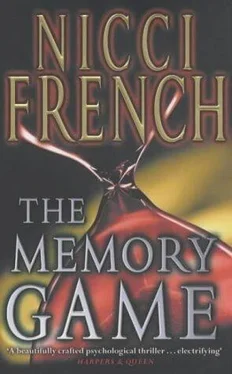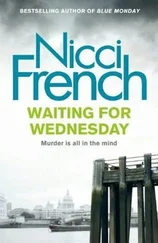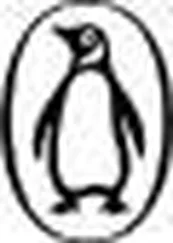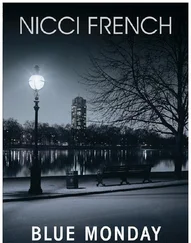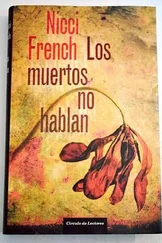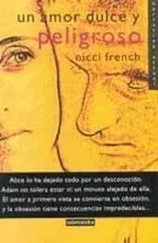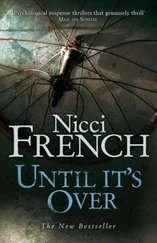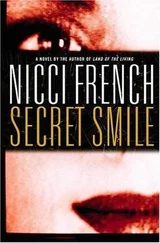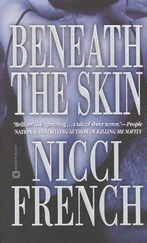Nicci French - The Memory Game
Здесь есть возможность читать онлайн «Nicci French - The Memory Game» весь текст электронной книги совершенно бесплатно (целиком полную версию без сокращений). В некоторых случаях можно слушать аудио, скачать через торрент в формате fb2 и присутствует краткое содержание. Жанр: Триллер, на английском языке. Описание произведения, (предисловие) а так же отзывы посетителей доступны на портале библиотеки ЛибКат.
- Название:The Memory Game
- Автор:
- Жанр:
- Год:неизвестен
- ISBN:нет данных
- Рейтинг книги:4 / 5. Голосов: 1
-
Избранное:Добавить в избранное
- Отзывы:
-
Ваша оценка:
- 80
- 1
- 2
- 3
- 4
- 5
The Memory Game: краткое содержание, описание и аннотация
Предлагаем к чтению аннотацию, описание, краткое содержание или предисловие (зависит от того, что написал сам автор книги «The Memory Game»). Если вы не нашли необходимую информацию о книге — напишите в комментариях, мы постараемся отыскать её.
The Memory Game — читать онлайн бесплатно полную книгу (весь текст) целиком
Ниже представлен текст книги, разбитый по страницам. Система сохранения места последней прочитанной страницы, позволяет с удобством читать онлайн бесплатно книгу «The Memory Game», без необходимости каждый раз заново искать на чём Вы остановились. Поставьте закладку, и сможете в любой момент перейти на страницу, на которой закончили чтение.
Интервал:
Закладка:
The house was closed up and I didn’t have a key. I’d never needed one. I peered through a window and saw empty rooms, bare boards, expanses of wallpaper with the pale rectangles recalling absent pictures. It was no longer ours and I took a bleak pleasure in seeing all signs of the Martello family stripped so brutally from the property. It was up for sale. Soon somebody else could move in their memories. My own were still cluttering up the place, like the crisp packets that blew down from the B road at the end of the drive. I turned away from the house. The dismal apology for a hole where Natalie had been found remained, half full of sludgy water. Was nobody ever going to fill it in?
But this was not what I had come to see. There was no point in messing around, there was nobody to bleat to. I just wanted to get this over quickly, see what I had to see. Then I would leave the Stead for ever, rejoin Kim, have a good meal, a good weekend, go back to London, get on with the rest of my life. I walked quickly across the shaggy lawn and felt the damp closing around my toes. Wrong bloody shoes. I reached the wood and to the left I could see Pullam Farm and to my right was the path that led along the wood and then back down and around to the Stead. Not today. Today, for the first time in a quarter of a century, I took the path into the wood that led to Cree’s Top and the River Col. It was a damp, misty morning, and I shivered even in my anorak. This wouldn’t take long. The path divided as I approached the rising ground which hid the river from sight and I took the right fork, which would bring me around the side of Cree’s Top to the path by the river.
The path was rarely used now and branches extended across it. After a few minutes of brushing them out of my face, I reached the edge of the Col and and the foot of Cree’s Top. I was back. One detail had started it all, attracted Alex’s interest, hadn’t it? Those funny little pubscent poems screwed up and tossed into the water as I’d sat here with my back to Cree’s Top and watched them float away down the Col. Would any of them have reached the sea? Or did they all snag in reeds round the first bend? I felt in my anorak pocket and extracted a menu from a local Indian take-away: Half-Price Madness. I screwed it into a ball and tossed it into the river.
The silliest thing happened, and it almost made me laugh. The river was flowing the wrong way. The scrunched up menu from The Pride of Bengal didn’t flow away from me and disappear round the bend. It flowed back past me. And, indeed, as I looked up the Col, against the flow, I saw that there was no bend in that direction for several hundred yards. What a stupid thing. I felt disoriented for a moment but it was quickly obvious to me what had happened. I quickly strode up Cree’s Top. The trees were thinned out now and when I reached the summit I could see that the mist had lifted and the view of the river and of the path proceeding along the side of it was clear. The Col curved slightly to the right and then back to its previous course, forming a reversed letter C. Fifty yards further on was the bridge from which Natalie had been seen that last time.
The path steepened sharply in front of me and I had to stop myself from trotting down the slope. When I reached the flat I sat down, with my back against the large rock at the foot of Cree’s Top. I felt in my pocket and found a credit card slip from a petrol station. If I were efficient I would file it somewhere and set it against something. I screwed it up and tossed it into the water. The sun was out now and the light blue paper was hard to pick out against the sparkling ripples but I focused intently on it as it picked up speed and disappeared round the grassy bend. Like a dream.
Thirty-Seven
We used to play by the copper beech tree, with its thick and grizzled trunk and its vivid flare of leaves. It stood in front of a dry stone wall, and if we stood on the wall the lower branches of the tree were near enough the ground to allow us to scramble up to what now seemed to me like dizzying heights. We could look down through the bronzed foliage at the Stead, watch the adults come and go through the porched front door, but no one could see us. We spent hours up there. We’d take dolls, then, when we were older, books and apples. Natalie and I would sit and talk while dappled light streamed through the leaves. We would watch scudding clouds and exchange secrets and the days seemed to pass slowly, so slowly. I hadn’t remembered this peaceful, happy Natalie enough. I hadn’t been a loyal enough friend to her after she had disappeared. If it had been me who had gone, suddenly and with no word of explanation, I knew that she would have furiously searched for me. She would have felt betrayed by my desertion and furious with adults who tried to comfort her. She would have been spitting mad. Whereas I – I had been passive and sorrowful, lying night after night in the room that had once been hers, dreaming of her and never once searching for her. Once, when Natalie and I had been playing hide-and-seek in the garden, I’d failed to find her, and after peering dismally behind large bushes and into garden sheds, I’d mooched into the kitchen where Martha had been making rock cakes. As I’d licked out the bowl, Natalie had burst into the room, ‘You give up too easily,’ she’d shouted at me. ‘I don’t know why I should bother with you when you just give up. I’ve gone off you , Jane Crane.’
I rubbed the bark with one finger. Martha had loved this tree too. She had planted crocuses and snowdrops around its base. I sat down and leant against the tree trunk, feeling its ridged age through my jacket.
When I was in my early twenties I had spent four months in Florence as an architectural assistant. I had adored the city and spent all my spare time wandering down narrow streets and into dark, incense-filled churches where statues of sightless madonnas stood in niches and old women burned candles for their dead.
I had gone back again ten years later, the map of the city still clear in my head, and soon discovered that I was slightly out of kilter. Roads were shorter than I remembered; where there should have been a view there was a tall building; the cafe where I’d drunk a daily espresso and eaten little rice cakes had shifted from the centre of the square to its corner. Claud had said calmly that you always had to rediscover places; the joy of travelling was that new meanings were always emerging and old ones altering. But I had felt obscurely cheated: I had wanted to step back into a past that was intact and where each site held its memories for me and instead I entered a city that had somehow grown away from me. Florence was no longer mine.
The same hazy dissatisfactions niggled at me now. On an impulse I zipped up my jacket to my chin, stood up and hoisted myself into the lowest branch of the tree. I clambered from branch to branch until I reached a familiar perch. I gazed through the skein of twigs with their pale green leaves at the Stead. There was the house, bearing its invisible signs of disintegration. How do you recognise, when all the features remain the same, the moment that life passes from the face of a friend, or know, although you can point to nothing that has changed, that a house is abandoned? From where I sat I could not see the front door, although I could clearly remember seeing it from here as a child. I clambered down the branches and jumped clumsily onto the grass; sat down once more with my back against the ancient tree.
I picked up my old diary which I’d picked out of my case as I’d set out that morning and idly started leafing through its later pages. Some entries were like triggers that brought memories easily back: the candle that had set fire to Alan’s beard when he’d leant over greedily to scoop up the last of the potatoes; I had laughed so hard that the muscles of my stomach had ached. Sailing in the gravel pit reservoir nearby, being frightened as the boat had keeled and water slopped over the edge but not wanting to admit it – certainly not admitting it to Natalie or to Theo, who were always physically brave and were contemptuous of timidity. Getting up at four in the morning with Alan and the twins to hear the dawn chorus and coming back chilly, ravenous and euphoric.
Читать дальшеИнтервал:
Закладка:
Похожие книги на «The Memory Game»
Представляем Вашему вниманию похожие книги на «The Memory Game» списком для выбора. Мы отобрали схожую по названию и смыслу литературу в надежде предоставить читателям больше вариантов отыскать новые, интересные, ещё непрочитанные произведения.
Обсуждение, отзывы о книге «The Memory Game» и просто собственные мнения читателей. Оставьте ваши комментарии, напишите, что Вы думаете о произведении, его смысле или главных героях. Укажите что конкретно понравилось, а что нет, и почему Вы так считаете.
